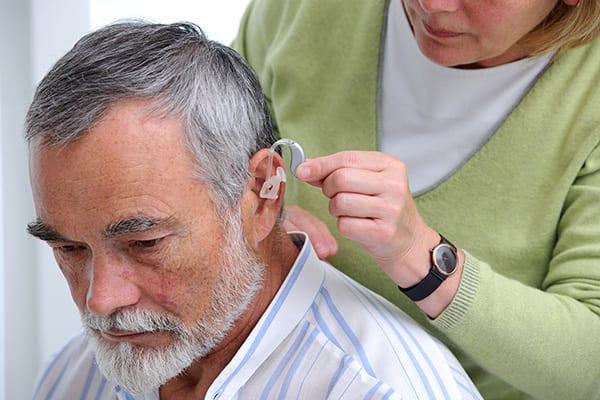
According to numerous medical studies, adults who have hearing loss are at a greater risk of developing dementia and other cognitive disorders.
Roughly 30% of adults aged 65 and over and 55% of 80 years and above will encounter some degree of hearing impairment. Experts anticipate that the number of people affected by some level of hearing loss will continue to grow – it’s a subject that will affect all of us at some point in our lives.
Research into hearing loss and dementia has reported that there could be a causal relationship between the two. Older adults who have mild-to-severe hearing loss are five times more prone to develop the illness than someone who doesn’t encounter any hearing loss.
Hearing loss by the numbers
Many people have mild hearing loss and don’t even realize it. This makes it even more essential to visit an audiologist for a hearing test now rather than later. Identifying and treating hearing loss now can help combat dementia down the line, especially with the figures research shows:
- Over five percent of the world’s population have disabling hearing loss, which is determined by a hearing loss higher than 40 decibels in adults.
- Estimates suggest that by 2050, one in 10 people will experience disabling hearing loss.
- The risk of dementia doubles in adults with mild hearing loss and triples for those with average hearing loss.
- Individuals with severe hearing loss are five times more likely to develop dementia than adults who don’t have any hearing loss
- An estimated 36% of individuals over 60 years old have a risk of dementia linked to untreated hearing loss.
The connection between hearing loss and dementia
The recent research into the link between hearing loss and dementia has identified several possible reasons why they are connected.
These studies suggest that hearing loss causes the brain to change, which raises the risk of dementia. When an individual experiences hearing loss, there is shrinkage in the section of the brain that deals with hearing due to the reduction of use – this loss of brain tissue results in a higher risk of dementia.
Another possible connection is because hearing loss means that the brain has to work overtime to understand others – this consumes mental energy. This overload on the brain leads to a reduction in other vital functions like thinking and remembering – setting the scene for dementia and other cognitive disorders.
The final link is that people who have undiagnosed hearing loss or severe hearing loss experience feelings of anxiety about being around others or in loud spaces. This can cause them to avoid social situations – the less the brain is being stimulated by being around others and interacting, the quicker it can decline.
Hearing aids can help prevent dementia
Lack of use, brain overload and isolation are reasons you might develop a cognitive disorder alongside your hearing loss; hearing aids can be an invaluable tool. Not only will they improve an individual’s hearing, but that improvement means that they can engage in social situations more as hearing aids lessen their anxiety. That will lead to increased independence, happiness and more fulfilling life – this keeps the brain active. An active brain means developing dementia is less likely.
As well as supporting those with hearing loss who don’t yet have a cognitive disorder, hearing aids are great tools for those who already have a cognitive ailment alongside hearing loss. Hearing aids will help lessen those symptoms of confusion and give back a feeling of freedom. There are several types available, including: in the ear (ITE), behind the ear (BTE) and in the canal (ITC). Additionally, there are many ways you can customize these devices for each individual’s specific needs. Visit an audiologist for a thorough hearing examination and expert advice on what the best option is for you.
Making informed decisions
Early identification and treatment of potential hearing loss will help minimize risks later in life. Or it could be that dementia is misdiagnosed as hearing loss because their symptoms are so similar – this would mean that the identification and treatment of hearing loss do have the potential to change someone’s life.
This extensive research into the links between hearing loss, dementia and other cognitive disorders means that audiologists can be better prepared to make the right decisions for each person. This research will fit into the long list of things that professionals already consider, such as the level of hearing loss and manual dexterity.
So now is not the time to wait! Book a hearing test or talk to a professional for the opportunity to improve every aspect of yours or loved ones’ life.
Seize this opportunity to learn more about us at The Hearing Doctors now by calling us at (630) 315-2899 or browsing our website.



